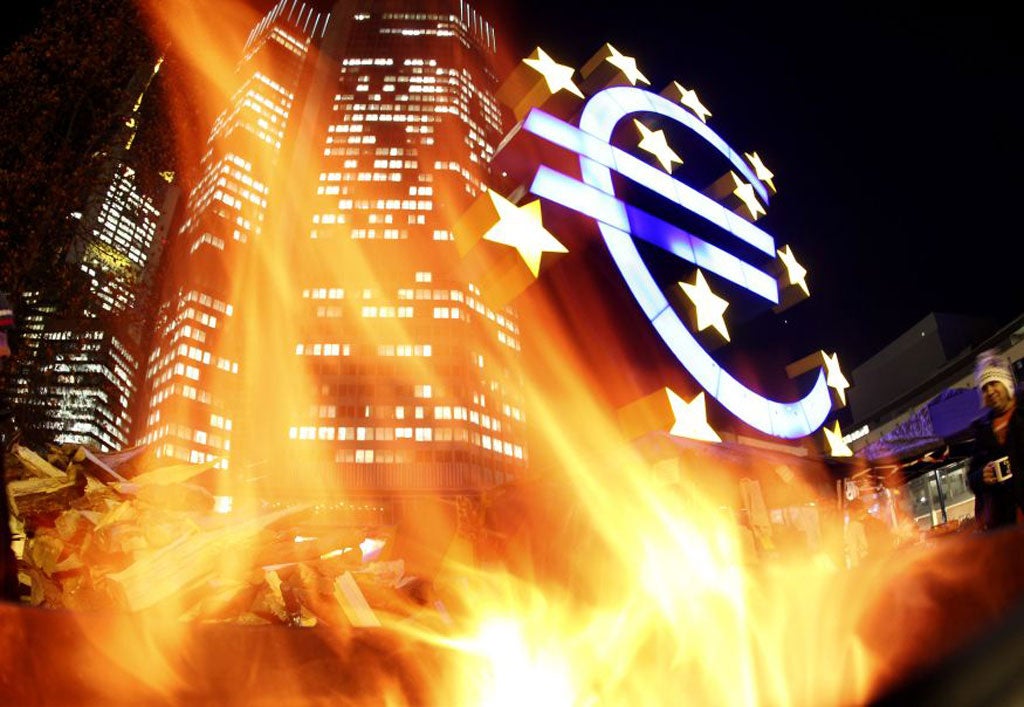Your support helps us to tell the story
From reproductive rights to climate change to Big Tech, The Independent is on the ground when the story is developing. Whether it's investigating the financials of Elon Musk's pro-Trump PAC or producing our latest documentary, 'The A Word', which shines a light on the American women fighting for reproductive rights, we know how important it is to parse out the facts from the messaging.
At such a critical moment in US history, we need reporters on the ground. Your donation allows us to keep sending journalists to speak to both sides of the story.
The Independent is trusted by Americans across the entire political spectrum. And unlike many other quality news outlets, we choose not to lock Americans out of our reporting and analysis with paywalls. We believe quality journalism should be available to everyone, paid for by those who can afford it.
Your support makes all the difference.The shockwaves from Greece's failure to form a coalition government have continued to reverberate around markets, though upbeat US economic indicators gave the more positive-minded investor something to latch on to.
Greece is headed for another general election next month after nine days of unsuccessful talks since the May 6 poll yielded a split vote with no one party able to govern on its own.
The next election on June 17 could well become a referendum over Greece's place in the euro - which could mean the established Greek political parties that took a hammering in the first poll might do better. However, markets are still worried that Syriza, the radical left coalition that came a surprise second in the first election, may actually emerge as the biggest party next time round. Led by Alexis Tsipras, Syriza has steadfastly stuck to its anti-austerity, anti-bailout position.
"The fear is that the anti-austerity vote will grow," said Fawad Razaqzada, market strategist at GFT Markets. "The big issue is how this squares with the Greeks' desire to keep the euro as their currency."
Without agreeing to another round of austerity measures, it is conceivable that Greece's partners in the eurozone will withhold the next round of bailout cash that is keeping it afloat. An exit from the euro could then become inevitable.
In Greece, that prospect has led to further outflows of Greek deposits, with some 800 million euro (£640 million) thought to have made their way out of Greek banks since the election. Those deposits may have found their way into safe-haven alternatives, such as German and British 10-year bonds, which have risen to record highs in the secondary markets. The US dollar has also mustered a lot of support through its perceived status as a safe haven asset, especially against the euro, which has sunk to near four-month lows of around 1.27.
European stocks, having opened sharply lower, steadied having taken a battering over the past week or so amid the political gridlock in Greece. Figures showing a 1.1% monthly rise in US industrial production and a further stabilisation in the housing market helped to shore up markets as Wall Street opened.
"Financial markets remain focused on Europe but at least the US data are not adding to the worry," said Jennifer Lee, an analyst at BMO Capital Markets.
In Europe, the FTSE 100 Index of leading British shares was up 0.1% at 5,441 while Germany's DAX rose 0.4% to 6,425. The CAC-40 in France outperformed its peers, trading 1.2% higher at 3,076.
In the US, the Dow Jones Industrial Average was 0.6% higher at 12,706 while the broader S&P 500 index rose 0.7% to 1,340.
Though the US data provided some relief, the focus of attention over the coming month until the Greek election will probably centre on Europe's debt crisis. The great fear is that other indebted countries, such as Spain and Italy, will suffer the fallout from contagion fears.
"Right now there is a serious risk that (investors) will not lend us money or they will do so at an astronomical rate," Spanish prime minister Mariano Rajoy told politicians.
Mr Rajoy was speaking as the country's bonds came under renewed pressure. The stabilisation in markets later eased that pressure. Nevertheless, the yield on Spain's 10-year bond stands at 6.27%. Though below the level hit last November, the rate is uncomfortably near the 7% level, widely considered to be unsustainable in the long run.
Earlier, Asian benchmarks recorded sharp losses earlier in the day.
Japan's Nikkei 225 index dropped 1.1% to close at 8,801.17, its lowest close since January 30, amid discouraging economic news. Core private sector machinery orders fell 2.8% in March, the first drop in three months, Japan's cabinet office said.
Hong Kong's Hang Seng plummeted 3.2% to 19,259.83 and South Korea's Kospi fell 3.1% to 1,840.53.
Mainland Chinese shares also lost ground, with the benchmark Shanghai Composite Index falling 1.2% to 2,346.19. The Shenzhen Composite Index dropped 1.4 % to 942.04.
AP

Join our commenting forum
Join thought-provoking conversations, follow other Independent readers and see their replies
Comments